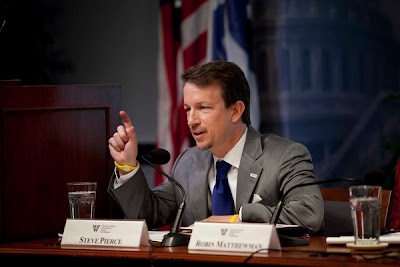Dec 15, 2011
Post-Busan Debrief on Aid Effectivess in Conflict-Affected Regions
Post-Busan Debrief on Aid Effectivess in Conflict-Affected Regions
U.S. government and civil society representatives who
participated in the Fourth High-Level Forum on Aid Effectiveness in Busan,
Republic of Korea Nov 29 - Dec 1 offered analysis of the major outcomes of the
historic forum and what it means for US-sponsored aid mechanisms and the larger
discussion of development effectiveness, especially in conflict-affected and
fragile states.
3P initiated collaboration with the Alliance forPeacebuilding, the Woodrow Wilson Center, USAID, InterAction, and CDA Collaborative Learning Projects to host a post-Busan de-briefing event on Dec
15th.
Click here for the event agenda.
Click here for a recording of the event.
 |
| From left: South African Ambassador to the U.S. Ibrahim Rasool,3P Program Manager John Filson, and World Vision Senior Policy Advisor Randy Tift |
Leaders of the official
USG delegation to Busan and several CSO participants in Busan provided analysis
of the historic forum and its implications for the way USAID and other donors
approach international development cooperation. The second of two panels
focused on the effectiveness questions in conflict-affected and fragile states,
such as G7+ countries in Asia and Sub-Saharan Africa where the lack of
effective development is a major obstacle to human security. Most of the 19 G7+
countries have not yet reached a single Millennium Development Goal, and it was
the sense of both U.S. officials and CSO representatives that the US must do
more to foster genuine improvement.
 | ||
|





